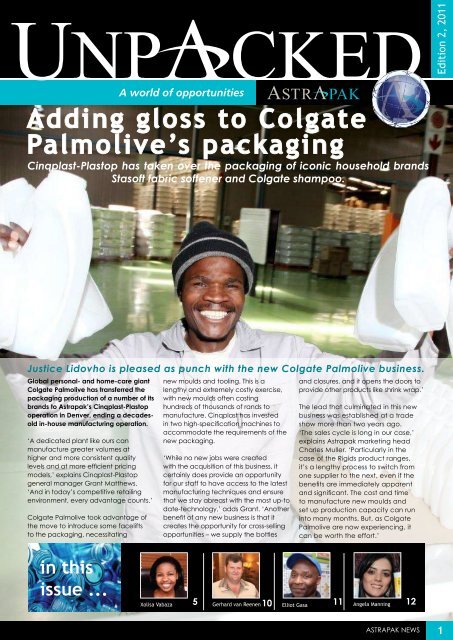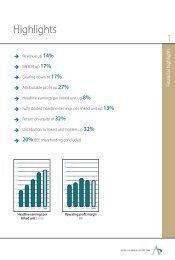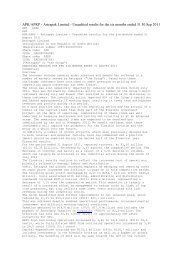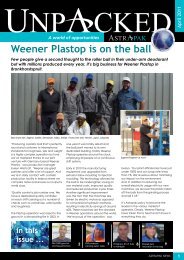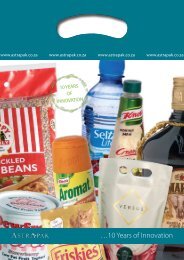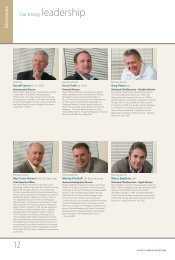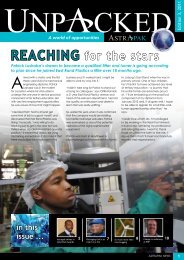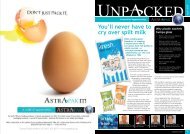Adding gloss to Colgate Palmolive's packaging
Adding gloss to Colgate Palmolive's packaging
Adding gloss to Colgate Palmolive's packaging
- No tags were found...
Create successful ePaper yourself
Turn your PDF publications into a flip-book with our unique Google optimized e-Paper software.
A mixed bag on the financial sideThe financial year that ended in February had a couple ofhighlights but these were overshadowed by aspects that didn’tperform <strong>to</strong> our expectations.4.9%1.9%37.1%3.5%VolumesNon-operationalCostsHeadline EarningsPer ShareTurnoverThe good news first: Group turnoverwas up <strong>to</strong> R2.71 billion (2010 : R2.61billion), an increase of 3.5% over lastyear, and on the volume side we had animpressive increase of almost 5%. Whenyou consider the general state of theeconomy – a highly competitive market,and slow consumer demand coupledwith declining selling prices – these weretwo very positive developments.And now for the bad news: increasingelectricity, labour, distribution anddepreciation costs all had a majorimpact on operational profitability,and while turnover was up, so were ourmanufacturing expenses. This led <strong>to</strong> analmost 12% drop in profit. (One positiveaspect was that our non-manufacturingcosts increased by a marginal 1.9%,which represents good control on theselling, administration and distributionoverhead side.)Some of the fac<strong>to</strong>rs that contributed <strong>to</strong>the less-than-stellar results were:• A protracted period of industrialaction during the last financial year atseveral of our operations, including ourbiggest single plant which, in addition<strong>to</strong> lost operational revenue, cost theGroup an additional R45 million.• A lethal cocktail of increasedcompetition with aggressive sellingprices as competi<strong>to</strong>rs strive <strong>to</strong> keepplants busy in the face of decliningconsumer demand, plus pricingpressure from cus<strong>to</strong>mers.• An environment that made itextremely difficult <strong>to</strong> timeously recoupincreased electricity and raw-materialprice increases.• Increased depreciation costs due<strong>to</strong> the delay in implementing a line ofequipment that was installed butnot fully operational.In spite of the results, the Group is stillcommitted <strong>to</strong> its capital expenditureprogramme, because it’s by investingin technology that we’ll secure ourfuture. Plastic <strong>packaging</strong> is going <strong>to</strong> bewith us for a long time <strong>to</strong> come, as itremains one of the most cost-effectiveways of protecting and presentinga wide range of products. We mustensure that we’re able <strong>to</strong> not onlymeet the needs of the future but beinnovative and set the trends.On the corporate front it was arelatively quiet year. The Groupacquired the remaining shares in thePlastech group, while at head officeGene Lapan resigned from his positionas company secretary and XolisaVabaza was appointed <strong>to</strong> the post. Seepage 5 for more on Xolisa.What of the future? You only have <strong>to</strong>listen <strong>to</strong> the radio or read a newspaper<strong>to</strong> know that there are still <strong>to</strong>ughtimes ahead. Astrapak is in it for thelong haul, however. Our commitment<strong>to</strong> new plant and equipment istestimony <strong>to</strong> that, but it will still requirea concerted effort from everyone inthe Group <strong>to</strong> help it make it happen.A machine is a machine is a machine;it’s the people who make the machineperform its wonders.2ASTRAPAK NEWS
Is this the winterof our discontent?In addition <strong>to</strong> someextremely cold weather,ongoing global economicuncertainty and <strong>to</strong>ugh localtrading conditions, we’vejust come through a spateof industrial action that hasme wondering if labour andbusiness read or hear thesame news.Ifully support the collectivebargaining process, the role thatlabour plays in ensuring equitableworking conditions for theirmembers and the opportunity <strong>to</strong> strikeas a democratic right. But at the sametime I have <strong>to</strong> ask if the latest roundsof work s<strong>to</strong>ppages in almost everyindustrial sec<strong>to</strong>r are what South Africareally needs.The world is in financial meltdown; theUnited States has come <strong>to</strong> the brinkof defaulting on its debt, Greece isin a major financial crisis, the UnitedKingdom has introduced stringentausterity measures and economiesaround the globe are losing jobs.In South Africa the PurchasingManagers’ Index – a reliable gaugeof the state of manufacturing – hasdropped <strong>to</strong> its lowest point in two years,and the Reserve Bank’s most recentbulletin indicates that nominal unitlabour costs have tripled since 2000.Unemployment now stands at 25.7%– the highest in seven years. Yet, inthe face of these unpleasant realities,we’ve just experienced some of themost ill-disciplined industrial actions everon Astrapak property. I’m extremelydisappointed at this.Astrapak has gone through massivechanges over the past two years or so.But every action we’ve taken has beenwith the goal of making our operationsglobally competitive, through newtechnology, world-class manufacturingprocesses, improved quality andcutting-edge innovation. These are theattributes that will lead <strong>to</strong> not only jobsecurity for our existing workforce butjob creation in the long term. Everysingle staff member has a responsibility<strong>to</strong> play his or her part – and thatapplies equally <strong>to</strong> the shop floor andhead office.Chief Executive Officer Marco Baglione addressed staff at the recent regional conferences held in CapeTown, Durban and Johannesburg.We’ve gone <strong>to</strong> great lengths <strong>to</strong> improvethe communication channels withinthe Group. My regular emailer goes<strong>to</strong> every person who has a companyemail address, Unpacked is distributed<strong>to</strong> every employee, and staff wereencouraged <strong>to</strong> attend the regionalconferences held recently in the maincentres. On <strong>to</strong>p of this, every operationhas its own internal communicationchannels. In short, there are lots of ways<strong>to</strong> make your voice heard.If we are <strong>to</strong> grow as a Group and acountry, we all need <strong>to</strong> see the biggerlong-term picture. Sure, double-digitwage increases may be a vic<strong>to</strong>ry in theshort term, but if these mean job lossesor fac<strong>to</strong>ry shutdowns because we’reglobally uncompetitive, then what havewe achieved?The business environment is extremely<strong>to</strong>ugh: consumers are cutting back,electricity prices have increased morethan 20% per annum for the past threeyears, and we’re under threat from anavalanche of imports. This is not the time<strong>to</strong> play hard ball on the labour front. Weneed <strong>to</strong> pull <strong>to</strong>gether, understand whatthe long-term objectives are and throwour full weight and enthusiasm behindmaking Astrapak – and South Africa –successful. This is the time <strong>to</strong> lead andbuild, not break down and destroy.Join me in leading. I’m excited atmaking Astrapak and every staffmember great.RegardsASTRAPAK NEWS3
It’s a wrap at TristarThe recent commissioning of a multi-million-rand three-layer castline at Tristar Plastics will ensure the company retains its lead in thechallenging pallet stabilisation industry for some time <strong>to</strong> come.‘Just about every manufacturer ofgoods, from beer <strong>to</strong> cement andeverything in between, ships theirproducts on pallets,’ says Tristar Plasticsgeneral manager André Smit. AndTristar has established itself as one ofthe leading producers of a variety ofstretch and shrink films primarily focusedon pallet stabilisation, ensuring thatproducts don’t shift during transit.Now, a new three-layer cast line hasjoined other cast machines as well asconventional blown-film extruders atthe Aero<strong>to</strong>n plant on the western sideof Johannesburg. Film manufacturedon cast lines is of a much higher qualitythan from a conventional blown line;gauge control is easier, which means amore consistent product, and the clarityis streets ahead – properties that areimportant <strong>to</strong> the target market.‘To the uninitiated, stretch film lookslike any old plastic film but it is a reallyamazing product with a number ofhighly technical properties that must bemanufactured <strong>to</strong> stringent quality andproperty-specific <strong>to</strong>lerances,’ Andréexplains.Some other significant changes havetaken place at Tristar over the pastThe new three-layer cast line is one of the most sophisticated of its kind.year, with a major overhaul of the seniormanagement team. GM André andsales manager Omesh Thilmun havecome on board <strong>to</strong> guide the companyforward.‘It’s still early days but things are settlingdown nicely,’ says André. ‘We’vemoved <strong>to</strong> a four-shift system and,despite some early misgivings from staff,I believe that overall conditions in theoperation have improved. It’simportant <strong>to</strong> align the culture withinthe operation with the ever-changingbusiness environment.’Another area where Tristar hasestablished itself is in the manufactureof the shrink shrouds and stretch-hoodsused <strong>to</strong> encapsulate an entire pallet –rather than film being spun around thepallet by hand or machine, a hood orshroud is placed over the pallet usingspecialised equipment. The company’sTri-stretch hood earned a silver medalin the annual Gold Pack awards for itsinnovative approach.Technician Jezzy Singh working on the new machine.‘The market for stretch and shrink filmis extremely competitive, particularlyin the face of the general economicslowdown we’ve experienced in thelast two years or so and the availablespare capacity in the market,’ saysAndré. ‘A welcome by-product of ourlean manufacturing philosophy andimplementation of Syspro is our ability<strong>to</strong> quickly adapt <strong>to</strong> cus<strong>to</strong>mer needs:we are able, at very short notice, <strong>to</strong>deliver a specific product <strong>to</strong> exactingneeds if a cus<strong>to</strong>mer experiences ashortage – something importers of filmare unable <strong>to</strong> do.’4ASTRAPAK NEWS
Up <strong>to</strong> the minute:Xolisa VabazaXolisa Vabaza – young, keen and full of energy – is Astrapak’snew company secretary. She tells us what her job entails.It was the dearth of black femalecompany secretaries in SouthAfrica that spurred Xolisa Vabaza<strong>to</strong> investigate a job that she seesas ‘interesting and attractive’. ‘I havea keen interest in company law, andwanted <strong>to</strong> embark on something thatwould challenge me in various areasbut also one where I would be able<strong>to</strong> incorporate my law background,’says this Wits BA(LLB) graduate, whowas working for Investec Private Bank’sLegal Department at the time.Xolisa started with Astrapak inNovember last year and hasn’t lookedback. ‘I enjoy the legal aspects ofmy job and the day-<strong>to</strong>-day tasks,’she says. These include assisting thechairman of various committees(including Exco, Audit and Board) byarranging and facilitating meetingsand taking minutes. On the legalside, she advises the direc<strong>to</strong>rs on risk,legal and corporate-governanceissues, and acts as the ‘middle man’between shareholders and thecompany.It’s a job that requires a fullunderstanding of the bigger pictureand a well-rounded knowledge ofhow the company operates. It alsorequires the skill <strong>to</strong> interact with peopleat all levels, from executive <strong>to</strong> shopfloor,and the willingness <strong>to</strong> keep upwith changes in the industry includinginternational trends in governanceand law. And Xolisa is up <strong>to</strong> the task:‘I enjoy being able <strong>to</strong> contributepositively <strong>to</strong> the company,’ she says.Keeping Astrapak’s corporate affairs on schedule and within law is all in a day’s work for Xolisa Vabaza.Xolisa, who’s a Durban Girls’ Collegematriculant, is single and has fourbrothers – three of them older then her– <strong>to</strong> keep her on her <strong>to</strong>es. ‘I love musicand people,’ she says, ‘and I try <strong>to</strong> keepmyself young and energetic.’ASTRAPAK NEWS5
The prosQuality: David S<strong>to</strong>rmDavid trained as an analytical chemist and also studied productionmanagement where he excelled. As regional quality manager, he’sresponsible for collating and standardising procedures and processes aroundall aspects of quality and their placement on a central server. He will also beidentifying a team of people <strong>to</strong> act regionally for improving quality across allfour companies. David’s primary role is <strong>to</strong> facilitate the implementation of theQuality TRACC pillar in<strong>to</strong> the region.Asset Care: Hardus BurgerHardus holds an N4 electrical certificate and has also completed a projectmanagement programme. In his capacity as regional asset care manager,he will standardise the approach <strong>to</strong> maintenance, with the monthly assetcaremeetings an important way of ensuring a uniform methodology. He’salso responsible for input on all major projects and ensuring that any newequipment complies with both performance and operating efficiencyguidelines. Hardus’s primary role is <strong>to</strong> facilitate the implementation of theAsset Care TRACC pillar in<strong>to</strong> the region.IT: Jason PageJason has spent his working life in information technology and is wellqualified for his role as regional IT manager. An important outcome for himis the creation and implementation of performance dashboards, a <strong>to</strong>ol thatmakes the interpretation of the mountains of data available from Sysproand other systems a simple task. These <strong>to</strong>ols are primarily focused on worldclass manufacturing and tie in closely <strong>to</strong> data extraction in line with theprogramme.WCM: Silvanus PillaySilvanus started out on the shop floor and brings wide-ranging practicalexperience <strong>to</strong> his role as regional TRACC facilita<strong>to</strong>r responsible for WCMimplementation. He views loss and waste analysis as a key measurement<strong>to</strong> highlight improvement opportunities and wants <strong>to</strong> see positive learningexperiences from one operation implemented at others. Silvanus’s primaryrole is <strong>to</strong> facilitate the implementation of the TRACC foundation practicesin<strong>to</strong> the region.Operations: Rory van ZylMechanical engineer Rory is the regional operations manager, tasked withimproving overall plant performance at all four businesses. He sees trainingas one of the primary areas that will receive his special focus. In addition <strong>to</strong>his involvement in all new projects, he has a special interest in the efficientutilisation of space as he feels it contributes <strong>to</strong> operational efficiencies.Working with the four other regional managers, he has a particular need andwish <strong>to</strong> see all disciplines pulling <strong>to</strong>gether <strong>to</strong> meet the overall objectives of thebusiness.ASTRAPAK NEWS 7
PullSwitchTwistElectricity SavingsPULL out chargers when not in use, TWIST in an energy-efficient light bulb, SWITCH off anyunused appliances and INSTALL a solar water geyser. www.SavingElectricity.org.zaKeeping tabs on energy consumptionAstrapak’s Energy Management Committee has established a set of energy guidelines forconverting existing equipment and regulating the purchase of new.Even before the most recent round of price hikes, electricity was the third-highest production input, pipped only by labour andraw materials. In light of this, it makes sense <strong>to</strong> familiarise yourself with the Energy Management Committee’s guidelines.For existing electrical equipment:• DC mo<strong>to</strong>rs should be replaced with AC mo<strong>to</strong>rs when they become unserviceable• Heater blankets should be added <strong>to</strong> all extruders• Light fittings should be replaced with energy-efficient versionsInstallWhen purchasing new equipment, it’s easier and cheaper <strong>to</strong> specify energy-efficient models upfront than <strong>to</strong> try and upgradelater. As with any equipment, the initial purchase cost is only one element of the decision-making process; the ‘whole life’cost (purchase price plus operating costs) is the more important benchmark. Bear in mind that the cost of energy used by aparticular machine during its lifetime will be much higher than the actual purchase cost, so energy-efficient machines savemoney in the long term.CategoryOffice equipmentHeating, ventilationand airconditioningAncillary equipmentInjection mouldersExtrusion – blownand cast filmExtrusion – blowmouldingGuidelinesSpecify only Energy Star-accredited products (see below)Refer <strong>to</strong> the Energy Technology list for guidance where appropriate (see below)• Chiller compressors should be of the screw type• Avoid direct expansion evapora<strong>to</strong>rs• Dryers should be of the carousel type, or• Low Pressure Drying technology, or• Infrared Rapid Drying for cooling <strong>to</strong>wers, boilers and lighting – refer <strong>to</strong> the EnergyTechnology list below• Give preference <strong>to</strong> all-electric over hydraulic• Ask suppliers about other energy-saving equipment•Ensure all new equipment is fitted with AC mo<strong>to</strong>rs and variable-speed drives•New extruders should be fitted with barrel heater insulation• Give preference <strong>to</strong> all-electric machines over hydraulicWhat is Energy Star?Energy Star is a joint programme of the US Environmental Protection Agency and the US Department of Energy, designed <strong>to</strong>help save money and protect the environment through energy-efficient products and practices. With the help of Energy Star,Americans saved enough energy in 2010 alone <strong>to</strong> avoid greenhouse-gas emissions equivalent <strong>to</strong> those from 33 million cars andsaved nearly $18 billion on their utility bills. Go <strong>to</strong> www.energy.gov for more information.What is the Energy Technology List?The Energy Technology List is a UK database of products that have been inspected and proven <strong>to</strong> be low carbon and energysaving. British organisations purchasing items from this approved list are able <strong>to</strong> get tax incentives, as it will help the countryreach its Kyo<strong>to</strong> target of reducing carbon emissions by 20%. Unfortunately, the tax benefits do not apply <strong>to</strong> South Africanbusinesses but the list is a great guideline for potential purchases that meet strict energy-saving criteria. Go <strong>to</strong> www.eca.gov.ukfor more information.8ASTRAPAK NEWS
Renske Snymangetting it right the first timeLife’s <strong>to</strong>o short <strong>to</strong> do anything twice. That’s the philosophy of RenskeSnyman, Plastform’s new general manager and the first woman <strong>to</strong>head up an Astrapak manufacturing operation.‘I always try <strong>to</strong> do whatever I have <strong>to</strong> do as correctly aspossible in the shortest possible time,’ says Plastform GMRenske Snyman. And she’s not kidding – she’s racked updegrees in commerce (a BCom from Unisa) and chemistry(a PhD from the University of Pre<strong>to</strong>ria), with an MBA from theUniversity of Stellenbosch due for completion this year.‘A tiger’s heart in a woman’s hide’After years of highly focused operational work with shorttermtargets at Mondi-Versapak, she decided <strong>to</strong> make acareer change, and Plastform had just the ticket. ‘“Generalmanager” is exactly what it says – general,’ says Renske, whobrings over a decade of management experience <strong>to</strong> her newposition. And it’s her strong financial, numerical and logicalskills, along with her pragmatic and assertive approach, thatmake her perfect for this role.Her passion and drive are evident in her private life <strong>to</strong>o – ‘Ilove hiking, camping, scuba-diving and gardening,’ shesays, adding that she’s done the very demanding eightdayNamibian Naukluft hiking trail. She’s also accomplishedat karate and played league tennis for many years. Morerecently, she’s fallen in love with ‘the gentleman’s game’– ‘You can find me on the golf course on most Saturdayafternoons,’ she says.Renske is the owner of some ‘very spoiled cats’. Which isinteresting, because her work/life philosophy – she describesherself as a ‘lazy perfectionist’ – more or less sums up acat’s life. And if she were an animal, she says, she’d be atiger. It was William Shakespeare, in his play King Henry VI,who described a tiger-hearted woman as ‘stern, flinty andremorseless’ – excellent characteristics for someone who likes<strong>to</strong> get the job done right the first time.Unpacked asked RenskeYour perfect day?On the golf course, hitting the perfectround.If you weren’t in the <strong>packaging</strong> industry,you would be…?A professional golfer or a Boeing pilot.Three people you’d like <strong>to</strong> have dinnerwith?Muhammad Ali, <strong>to</strong> find out why the hellhe allowed himself <strong>to</strong> get hit until he wasstupid; Nelson Mandela, for his input onhow he kept communication lines openfrom a jail on an isolated island; and OprahWinfrey, <strong>to</strong> chat the night away.If you won the Lot<strong>to</strong>…?If anyone epi<strong>to</strong>mises a 25-hour day, it’s Plastform’s new generalmanager Renske Snyman.I wouldn’t tell anyone.ASTRAPAK NEWS 9
Gerhard does it againThe annual Rainmaker Awards have becomesynonymous with exemplary achievementand for the first time one person has wontwo years in a row.Super-achiever sales manager Gerhard van Reenengoes out there and makes it happen, and that’s oneof the reasons he’s walked off with the RainmakerAward for the second year running.‘Business success comes from people doing the work atgrassroots and I’m particularly pleased at the effort Gerhardand general manager Brent Grant have put in<strong>to</strong> MarcomPlastics over the past few years,’ says coastal chief operatingofficer Keith Watkins. ‘Through a combination of Gerhardgoing out and securing the business and Brent and his teamat the plant ensuring the orders could be manufactured anddelivered, they’ve grown turnover at the operation almostthreefold in three years. It’s an amazing success s<strong>to</strong>ry andshould serve as an inspiration for other operations.’The <strong>to</strong>p-performing company of the year was awarded <strong>to</strong>Durban-based Barrier Film Converters. The operation hasstruggled in a competitive marketplace for several yearsbut thanks <strong>to</strong> the solid foundation laid by Johan Schoemanand the new leadership of Graham Bowran, the operation ismaking real progress.‘It’s a <strong>to</strong>ugh business environment out there, it doesn’t matterwhat line of work you’re in, and it’s not likely <strong>to</strong> get easier anytime soon,’ adds Keith. ‘The successful businesses are thosewith people who’re willing <strong>to</strong> go the extra mile <strong>to</strong> make thingshappen, regardless of the so-called obstacles in their way.’Barrier Film Converters was awarded the <strong>to</strong>p-performing company trophy.Graham Bowran (left) accepts the trophy from chief operating officer(coastal) Keith Watkins.Congratulations <strong>to</strong> this year’s winners, and here’s thechallenge for next year’s winners <strong>to</strong> step up <strong>to</strong> the plate andbe recognised.Gerhard van Reenen (left) is fast establishing himself as a super-achiever within Astrapak. Here, he’s accompanied by Marcom Plastic’s GM Brent Grant.10ASTRAPAK NEWS
Shooting starElliott Gasa has spent three decades in plastics, but wishes he’d come acrossWorld Class Manufacturing far earlier.PAK 2000 printing manager Elliott Gasais a convert. Initially sceptical aboutWorld Class Manufacturing (WCM), henow can’t recommend it highly enoughfor boosting productivity, efficiency andwork ethic. ‘WCM has been a careerlandmark,’ he says. ‘The department isnow an environment where everyonewillingly pushes themselves <strong>to</strong> theirbest and beyond, and benefits frommanagement recognition and rewardfor their efforts.’Elliott’s rise up the ranks at his firstcompany was meteoric: he beganas a packer in 1981 and, quicklyrecognised for his intelligence andnatural leadership skills, was promoted<strong>to</strong> machine opera<strong>to</strong>r. Only 18 monthsafter earning his first pay package, hebecame the youngest supervisor in thecompany.In 1987, Elliott moved <strong>to</strong> Metal Box,only <strong>to</strong> resign the following year forpersonal reasons and establish a tuckshop business. Yet that brief stint had puthim in <strong>to</strong>uch with Alan Payne and anout-of-the-blue telephone call in 1994changed Elliott’s life path again. Alanwas establishing PAK 2000 and wantedElliott’s print opera<strong>to</strong>r skills. Leaving thetuck shop in his wife Mthiyani’s capablehands, Elliott again embraced theindustry, with the additional directive <strong>to</strong>train others.Three years ago Elliot was introduced <strong>to</strong>WCM. His role was <strong>to</strong> train employeesin<strong>to</strong> the system, and he quickly realisedthat successfully implementing WCMdemanded a mindset shift from seniormanagement <strong>to</strong> the lowest floor worker.‘Essentially, WCM made my job easierbecause the focus shifted <strong>to</strong> teamworkand employee support, so everyonerealised their value but could also pickup for colleagues should the needarise. Inherent was leading by example,where the highest employee wasn’tbeyond picking up papers off thefac<strong>to</strong>ry floor,’ he explains.The results speak volumes. Wherepreviously department scrapaccounted for 8% and production onmachinery only 65%, scrap has dropped<strong>to</strong> 0.8% and production risen <strong>to</strong> 80% – aturnaround achieved in only one yearand with the same employees.In his current role, this father of seven(he has two sons and five daughters)has been exposed <strong>to</strong> computers – andso found yet another hidden talent.He also learnt <strong>to</strong> operate the sixcolourprinter with little formal trainingbeyond some directives from the Italianmanufacturers ‘because it was a puzzle<strong>to</strong> solve’.‘My department operates increasinglysmoothly, but one move that wouldboost efficiency would be ensuringthe bottles shift seamlessly betweenblow-moulding and printing,’ he says. ‘Itrequires managerial investment, but it’sa legacy I’d love <strong>to</strong> see from my yearsin the company.’Elliot Gasa (left) has shown that there’s no substitute for hard work, commitment and enthusiasm. Here, he updates TRACC facilita<strong>to</strong>r Silvanus Pillay on WCMprogress within the printing department at PAK 2000.ASTRAPAK NEWS 11


